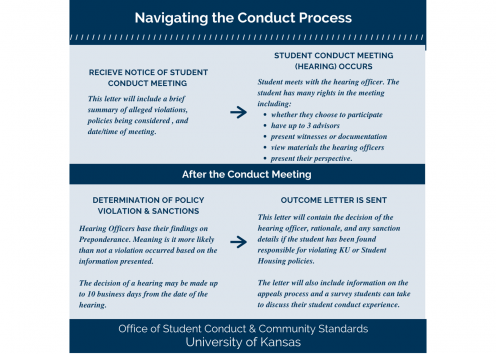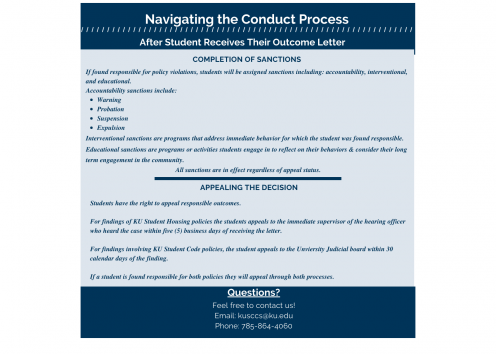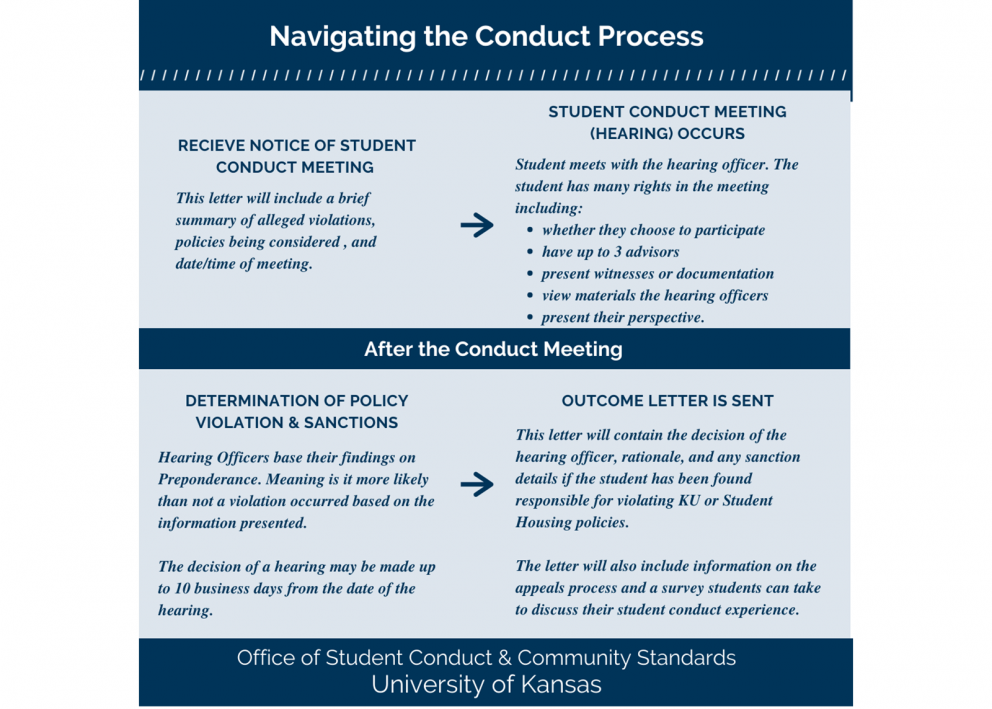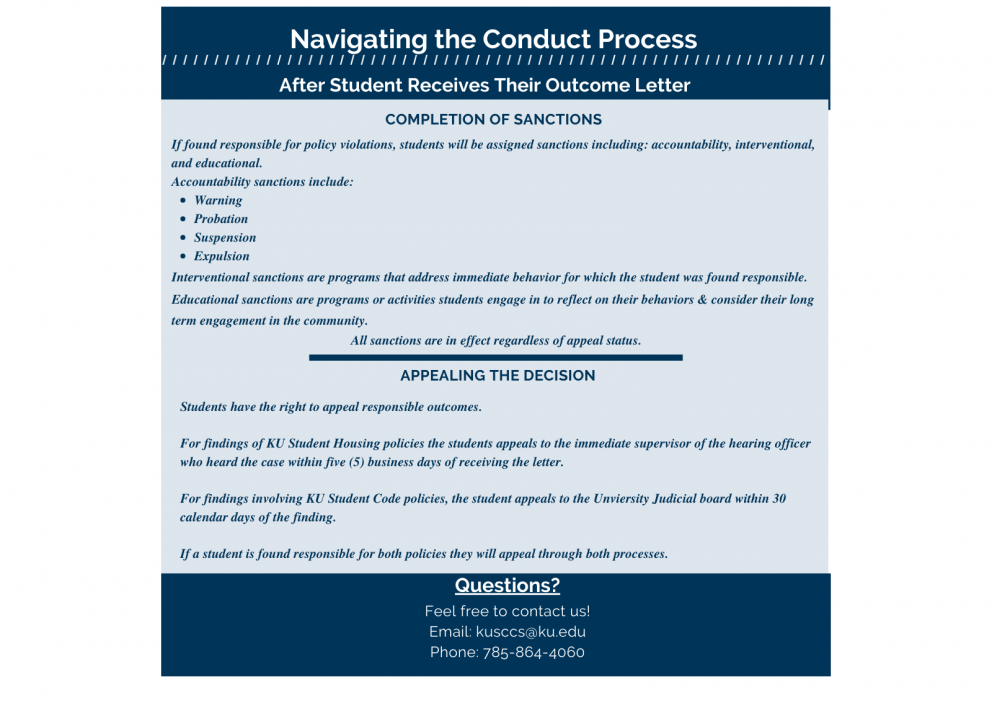Navigating Administrative & Formal Hearings
Full Student Non-Academic Conduct Procedures (pdf)
Things to Know About the Conduct Process
1. Present their version of the events in question.
2. Be accompanied by an advisor(s). They have the right to up to three advisors.
3. Have witnesses present information, in writing or in person, on their or its behalf.
4. Not participate or answer questions in a hearing.
5. Question any statements presented (directly or indirectly).
6. The hearing officer/body be disinterested and able to act impartially. Note: Graduate level and Professional level staff working within student housing will often serve as hearing officers within their specific housing facilities due to greater rapport with student residents, and to foster a sense of community. This alone does not create an interest in the complaint.
7. Appeal the outcome of the hearing.
8. For the respondent, receive advance notice of the alleged violation(s), a general summary of the complaint, who to contact for a meeting, and the date by which that contact must occur.
What happens at an informal administrative hearing?
A student will be sent a letter setting a date, time, and location to meet with a Hearing Officer in Student Housing or the Office of Student Conduct and Community Standards. The Hearing Officer will explain KU's handling of conduct matters, the student's rights in the process, possible sanctions, and answer any questions. The meeting is not audio recorded unless it could result in suspension from the university. The student is asked to share their perspective on the incident and reflect on what has occurred. If the student takes responsibility for their actions, the Hearing Officer will consider the possible sanctions and share those with the student during their conversation or in the Outcome Letter sent after the meeting. Most students are apprehensive about coming into talk to a University official about their misconduct; yet, the conversation is meant to be educational, informal, and grounded in helping the student grow from the experience regardless of the outcome.
What happens at a formal panel hearing?
A panel hearing is conducted with more formal procedures and is recorded. An audio recording will be made of the proceeding, and each party is entitled to receive a copy. At the hearing, the Hearing Panel Chairperson will:
- Introduce the hearing panel members, the complainant, the student/organization charged, and their representatives, if any.
- Explain the hearing procedures.
- Review the charges of the Code violation which led to the hearing.
- State that the charging party (Complainant) has the responsibility to persuade the panel by a preponderance of the information that a violation of the Code occurred.
- Review the rights of the party charged (Respondent student/organization).
- Permit the Complainant to state the complaint and explain the incident/event.
- Permit the Respondent student/organization to reply and explain the incident/event.
- Permit Hearing Panel members to ask questions of either party or of witnesses.
- Permit each party to ask questions of one another and any witnesses appearing.
- State that the Hearing Panel will make a written report of its findings and recommendations to the Office of the Vice Provost for Student Affairs
Student Conduct and Community Standards takes an educational approach to all conduct cases, not a punitive one. When students are found responsible for the allegations, it is our opportunity to educate the student/student organization on the effects of his/her/their behavior and to affect a change in the student’s behavior for the future. The basics of our philosophy follow:
- We protect the educational environment: We are concerned for the quality of the educational environment. We must ensure that the best possible conditions for learning are maintained. It is, therefore, our job to set reasonable limits on student behavior and enforce them consistently. Conduct should be a learning experience for the student respondent, as it is important for the student(s)/student organization to learn that behavior has consequences, so that they may consider these consequences before taking an action. It is hoped that the conduct process will allow the student(s)/student organizations to become more responsible for their actions in the future, thus developing mature judgment and socially acceptable behavioral limitations.
- We ensure that the sanction is appropriate: The sanction should always fit the seriousness of the violation. If a student/student organization commits a major violation that puts their own welfare at risk, they should not receive merely a warning except in very unusual circumstances. It also goes to say that, if a minor violation is committed, a sanction such as suspension would be unnecessary. If we do not respond to varying violations appropriately, the quality of conduct across the entire campus will undoubtedly suffer.
- We treat students as individuals: Each student is considered as an individual. There must, then, be a range of sanctions appropriate for a given violation. Whether the sanction given for a violation is relatively high or relatively low in this range depends on a variety of factors, including the degree to which the student takes responsibility, a student’s prior history, a student’s intent, and a student’s cooperation.
- We keep in mind the “big picture”: Keep in mind that, in judging the seriousness of a violation and arriving at an appropriate sanction, the University will not always be dealing with questions of morality. The University must ask itself this practical question to guide them in their decision: If we allow this behavior to occur, and it becomes commonplace, what will be the result? In light of this question, some actions not usually considered immoral are ones which could cause serious problems in the community, and which, therefore, should be viewed seriously.
If a decision is made that the student disagrees with, they have the right to appeal and the process is outlined in the Outcome Letter they received from their Hearing Officer. An appeal is defined as a review of the original case. This may involve a review of the decision as recorded on paper, or other procedures as described below. During an appeal, the burden is placed on the appealing student or student organization representative to demonstrate why the finding or sanction should be changed.The appropriate appeal process is based on where the findings came from.
Student Housing Findings
A student has five (5) business days from the date they are sent their outcome letter to submit a Student Housing appeal via the appropriate form contained in their outcome letter. Appeals for Student Housing outcomes may be submitted and reviewed by the immediate supervisor of the Hearing Officer for only the following reasons:
- Proper procedures have not been followed
- the student believes the sanction is excessive given the violation
- the student has obtained new relevant information not available at the time of the hearing
Code Findings
An appeal is defined as a review of the original case. This may involve a review of the decision as recorded on paper, or other procedures as described below. During an appeal, the burden is placed on the appealing student or student organization representative to demonstrate why the finding or sanction should be changed.
Appeals may be based only on the following grounds (as determined by University Senate Rules and Regulations 6.7.3):
- Failure to Follow Procedures. The decision of a hearing body may be set aside if the hearing body failed to follow required procedures. However, if the failure to follow procedures was harmless, that is, did not prejudice the appellant, the hearing body decision should be affirmed notwithstanding the procedural error. The burden shall be on the appellant to identify the prejudicial effects of any alleged procedural error
- Inconsistency with Applicable Provisions. The decision of a hearing body shall be set aside if applicable provisions of the University Senate Code, University Senate Rules and Regulations, Handbook for Faculty and Other Unclassified Staff, Board of Regents policies or procedures, or state of federal law require a contrary result.
- Factual Determinations Not Supported by the Record. The decision of a hearing body may be set aside if it is not supported by substantial evidence in the record compiled at the hearing. For purposes of this provision, a decision is supported by substantial evidence if a reasonable person could find that the decision was justified on the basis of the evidence submitted at the hearing, with due regard for any contrary evidence in the record. The appeals panel should bear in mind the superior opportunity of the hearing panel to judge the credibility of witnesses.
- Arbitrary and Capricious Decisions. In exceptional cases, the decision of a hearing body may be set aside if it is arbitrary, capricious or an abuse of discretion. A decision is arbitrary and capricious or an abuse of discretion if it is based on improper considerations, entirely fails to consider an important aspect of the problem, or lacks a plausible explanation of the connection between facts found and the recommendations made.
Appeal requests may be denied in cases not having sufficient grounds in one or more of these areas. All appeals must be submitted to University Governance Office located in Strong Hall, Room 33.
The written request for an appeal, stating the specific grounds upon which the appeal is based, must be received by University Governance the end of the thirtieth (30th) calendar day following the rendering of charges against the students/student organization. Appeals submitted after the thirtieth calendar day will not be accepted.
The Chair of the University Judicial Board, through University Governance, shall appoint an appeal panel which shall hear all appeals from formal hearings and from decisions pursuant to the administration of the Code of Student Rights and Responsibilities. The appeal panel will review the entire hearing file and record of the hearing (if requested). The appeal panel may request a personal appearance of the student or organizational representative to discuss the incident in question. After reviewing the record, and depending upon the demonstrated grounds for appeal, the appeal panel may take any of the following actions:
- Affirm the charge;
- Impose greater or lesser sanctions; or
- Order a new conduct hearing.
The action of the panel considering an appeal will be communicated to the student or organizational representative in writing. This is the final step in the appeal process.
TITLE IX RESOLUTION PROCEDURES
Title IX of the Education Amendments of 1972 states:
No person in the United States shall, on the basis of sex, be excluded from participation in, be denied the benefits of, or be subjected to discrimination under any education program or activity receiving Federal financial assistance.
The purpose of Title IX is to end discrimination on the basis of sex in education and applies to all programs and activities that receive federal funding. Title IX encompasses many forms of sex-based discrimination, including, but not limited to addressing sexual misconduct (including sexual harassment), sexual violence (including sexual assault and domestic/dating/intimate partner violence), and stalking. Federal regulations distinguish Title IX violations as occurring on campus, within the context of an educational program or activity, or in property owned or operated by a registered student organization. Sexual harassment, sexual assault, and other forms of gender-based violence occurring away from campus will be investigated through the Discrimination Complaint Resolution Process and adjudicated via the Non-Academic Misconduct Procedures.
Alleged violations should be reported immediately to the Office of Civil Rights & Title IX (OCRTIX), the KU unit responsible for Title IX compliance. Incidents may be reported online. IOA will confirm receipt of the report and seek additional information, if needed. OCRTIX will then contact the complainant (alleged victim) to offer supportive measures and options for investigation. The complainant has the opportunity to file a formal complaint or dismiss the report. If OCRTIX begins an investigation into the alleged violation, they will notify the respondent (alleged responsible student) of the investigation. Respondents and complainants will be offered supportive measures in equal measure. For more information, see the Title IX Resolution Process.
Following an investigation, OCRTIX informs Student Conduct and Community Standards of the results. Student Conduct and Community Standards coordinates a hearing to resolve the charges and issue sanctions, if appropriate. Title IX hearings follow the Hearing Procedures for Complaints of Sexual Harassment. Hearing panelists undergo extensive training to reduce bias, support due process for all parties, and ensure compliance with the May 2020 Title IX regulations. Training materials are available through the Student Conduct Institute.



